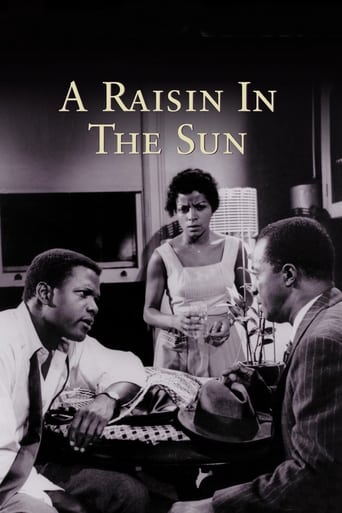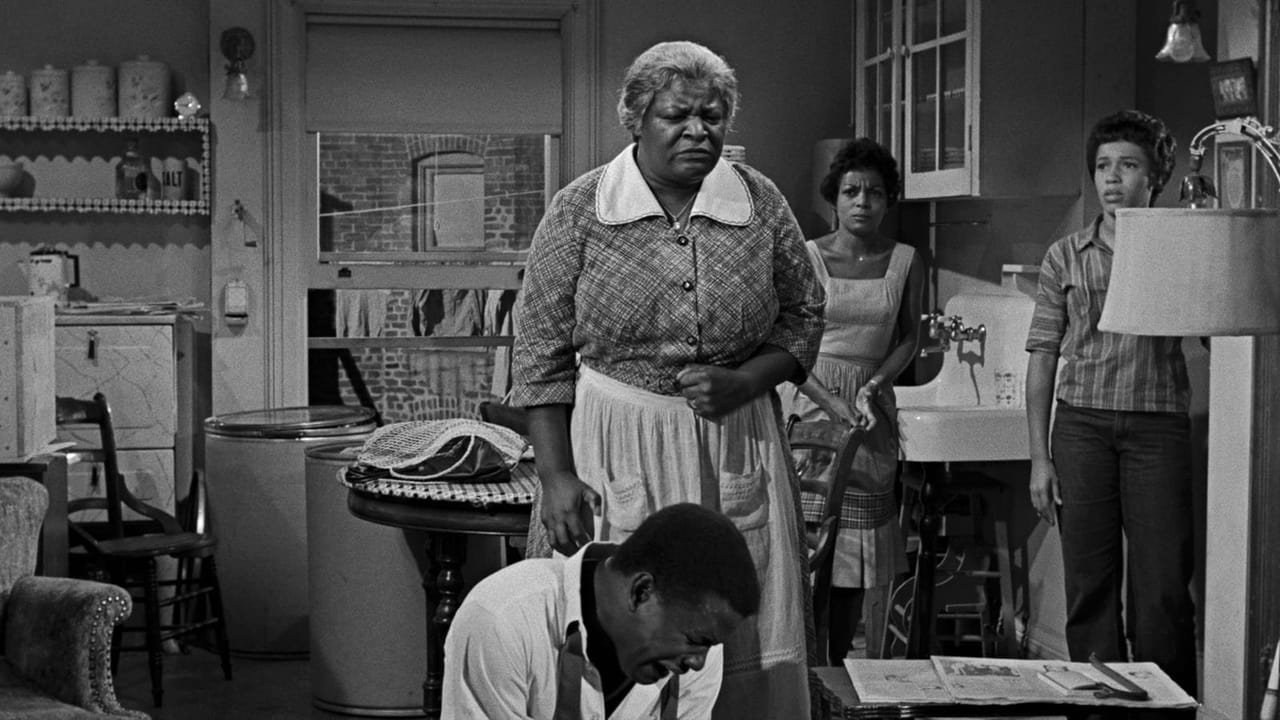grantss
The Younger family are a working class black family with three generations, five people, living in a cramped apartment. However, it appears their fortunes are about to change as grandmother Younger is about to receive a large insurance payout. However, there is considerable disagreement within the household on how the money will be spent, resulting in friction within the Younger family.Powerful and profound, but takes forever to make its point - overwrought and unnecessarily protracted. The ultimate theme is very admirable, and very necessary, especially in the 1960s. Well set up too, in getting to the punchline.Too well set up. You have to wait for about 90 minutes for anything like a degree of focus or for a payoff for everything that came before. Until then the movie seemed to drift.Worst of all, the dialogue is incredibly padded. The writer's reasoning seemed to be - why use 10 words when 100 will do? Every bit of dialogue is long-winded and feels like a speech, enough to make even Shakespeare seem succinct. So many times I caught myself thinking "Geez, just get to the point!".Some brevity and this would have been a superb movie. Instead it is a bit of an ordeal, with a good payoff at the end.
Gideon24
A powerhouse ensemble cast is the primary selling point of the 1961 version of A Raisin in the Sun.This is the first film version of the play by Lorraine Hansberry that centers on the Younger clan, a black family living in a cramped Chicago tenement whose lives are about to be altered because of a financial windfall. Lena Younger (Claudia McNeil) is the strong, God-fearing matriarch of the family who is patiently awaiting the arrival of a $10,000 insurance check she is receiving because of the death of her husband. Walter Lee Younger (Sidney Poitier) is Lena's son, a chauffeur who wants to change his life by getting his mother to give him the money so that he can invest it in part ownership of a liquor store. Ruth Younger (Ruby Dee) is Walter Lee's level-headed wife and family referee, who has just learned she is pregnant with her second child; Beneatha Younger (Diana Sands), Walter Lee's sister, is a radical-thinking college student, , who wants to be a doctor someday and torn between her comfortable relationship with George (Louis Gossett) and an African student (Ivan Dixon) who is turning Beneatha's head by exposing her to her African heritage.This film sizzles primarily due to the conflict created between Lena and Walter Lee from Lena's belief that liquor is just a tool of the devil and Walter Lee's belief that his father would have wanted him to use the money to be more than a chauffeur and be the captain of his own destiny.As expected, a 1961 film with an all-black cast was filmed on a shoestring budget, but the powerhouse performances make this film appointment viewing. Next to To Sir with Love, this is my favorite Poitier performance...he is intense and riveting despite the fact that Poitier's screen persona is so much more intelligent than the character he is playing and yet he doesn't make a single false or affected move on screen. McNeil, Dee, and Sands provide solid support to Poitier, who completely dominates this film, but they never allow Poitier to blow them off the screen either. Loved Gossett as Beneatha's tight-ass fiancée too.The film works due to a compelling story and a charismatic performance from Poitier that makes this film still watchable after all these years. This film was remade for television twice with Danny Glover and Sean "Puffy" Combs taking over Poitier's role. It was also turned into a Broadway musical during the 1980's called Raisin.
ironhorse_iv
It's rare to see a film version of a movie, be as good as the play version, but 1961's 'A Raisin in the Sun' does that. Based on the play made in 1959 by an African-American playwright and painter Lorraine Hansberry. Raisin in the Sun was the first drama written by a black woman to be produced on Broadway. Young Lorraine grew up in a Chicago's Woodlawn neighborhood and her own experiences lead to the play's story. She got the title of the play by finding it in a Langston Hughes's poem book 'Harlem' which is quotes in the poem 'A dream deferred'. The title, 'Raisin in the Sun' referred in the original poem about the hundreds of African American slaves that work in the hot sun in the cotton fields whom dream dry up like a raisin. In the play and the movie, its symbolism the frustration of blacks working trying to make a better life for themselves, but in the end, their dream are forgotten or put off due to the mixer of racism and classism. The movie story is about a working-class family called the Youngers. Living in a lousy apartment for decades, they want to and wish to leave the place behind. The central idea of the play is concerned with fighting off the myth of black contentment. It shows the stress of being in poverty when the large family is crammed into a small apartment. The plot get going when the family finds out that Lena AKA Mama (Claudia McNeil) got an insurance check for $10,000. Each members of the family find themselves having their own version of what to do with an insurance check. Walter Lee (Sidney Poitler) a poor chauffeur, dreams of making a fortune by investing the money in a liquor business against the wishes of both his wife and the mother. Sidney Poitler does a great job as Walter. It's one of his best roles in my opinion. You can see the want in his eyes. The pain, he goes through when it doesn't come his way. Powerful. Beneatha (Diana Sands), his flighty college student sister also wants the money so that she can be a doctor and live in Africa with one of her two boyfriends. One is a boy, George Murchison (Louis Gossett), a wealthy Negro concerned with appearances and material, while the second, Joseph Asagai (Ivan Dixon), is a native African that inspires her intellectually and spiritually. Great symbolism with Beneatha's hair in the film. When the movie begins, Beneatha has straightened hair. Midway through the play, after Asagai visits her and questions her hairstyle, she cuts her Caucasian-seeming hair for the new radical afro represents her embracing of her African heritage. Beneatha's cutting of her hair is a very powerful social statement in the 1960's, as she symbolically declares that natural black is beautiful and wouldn't conform to the style society dictates at the time. It's become a symbol of her anti-assimilationist beliefs. The film dealt with the talk about racism, not only with whites and blacks, but also black against black. One of the first major allusions to any sort of racism appears with the character of George Murchison. When the wealthy George enters the picture, the Younger family sees the differences in race and grouped him with snobbish white people. Mama dreams of buying a home in all-white neighborhood with her money, but fears that they would be faced with racist neighbors, and people trying to buy them out to prevent the neighborhood's integration. One such person trying to buy them out is Karl Aka Mark Linder (John Fielder) whom openly states the racism present in the neighborhood that Mama wants to live. While he at first sugarcoats his words, he tells the Youngers that they are not wanted in the neighborhood because they are Negroes. Mama's choice soon become troublesome, as one choice can lead them into deeply poverty or salvation. A Raisin in the Sun is essentially about dreams, as the main characters struggle to deal with the oppressive circumstances that rule their lives, both with happiness and depression. The movie follows a good amount of themes such as the need to fight racial discrimination in a powerfully demonstrates of the family strength. By having a strong family, it shows that the African American community, that the importance of family is key to success. One great thing about the movie is how little, they change from the play. Most of the movie takes place in the home. Was the bar scene really needed? Not really, the producers could had shown Walter's alcoholic nature, just with him coming home with a bottle, and we would get the same results. But by showing the audience how cramped the apartment is, we get how badly they are struggling. Plus, it's nice to see a movie with few cuts scenes. Director Daniel Petrie did a great job. I would had love to see more of Mama's plant. In the play, Mama's plant represents both Mama's care and her dream for her family. Still, the movie does a great job with dealing with other issues, such as abortion, greed, and the lack of religion. The movie follows the play very well. While, 2008's TV movie 'A Raisin in the Sun' does a good job as well. It's doesn't beat this movie by acting standards and scene delivery. While, one might label this as a 'black people' movie, I found its subject matter, universal. I think this film dealt with everything any common folk might have to deal with, and that's why I think the movie is so well-made.
joseg3192
A Raisin in the Sun is a wonderful movie about a poor black family trying to achieve the American dream. The odd thing, probably something that speaks to the heart of African American audiences, is that this family has been in the country for six generations and still doesn't have anything to show for it because of racism in the country. The movie is full of deep well made characters, each with internal conflicts, who are all having conflicts with each other. The movie is essentially about politics within a family household, who is the leader and has the power, and who gets to decide what is best for the family. Each of the characters seem to have their own personal agenda and there is conflict between the characters that exist outside of the squabble for the $10,000. The film manages depicts the many avenues that the family members (and African Americans in that era) are trying to explore to escape poverty to achieve a better future. This film taught me something new, every time a different character enters a scene a new scene begins. The scene takes on a different tone and adds a new conflict to drive the scene without changing the setting or time, it's done just by introducing a different character through the door. Ultimately the film was wonderful but I felt some of the end scenes dragged on a little too long and kept me waiting too long for the final resolution. The last scenes leading up to Walter's final decision weren't filled with tension or conflict like the previous scenes, it was literally them just waiting and sobbing, something that could of been cut down. Still this is a great film that is a must see for any up and coming screen writer, I highly recommend it.





 AD
AD





